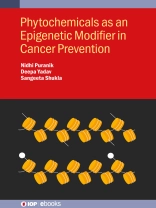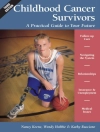This book is based on detailed coverage of the role of phytochemicals as a epigenetic modifier to prevent various cancers. It presents the novel features of phytochemicals and their role in preventing cancer by regulating DNA, RNA and protein levels. It also covers the role of various kinds of phytochemicals especially focused on vitamins, flavconoids, polyphenois and phytols in cancer prevention and treatment. It also deals with the discovery of novel biomarkers for cancer treatment that are enabled by phytochemical modulation of epigenetic activity, highlighting its promise as an alternative treatment approach in cancer. The major goal of this project is to summarise what we currently know about natural product active chemicals, including their pharmacologic activity and molecular markers. There are several books available on phytochemicals and cancer, but to date there is no such book reported which compiles the broad spectrum of applications of phytochemicals at epigenetic levels. This project is themed to combine, promote and lift the potentialities of dietary phytochemicals in cancer prevention and treatment and reduce the dependability on synthetic drugs which often cause many negative side effects.
Key Features:
* Details the role of various kinds of phytochemicals in cancer chemoprevention by specific targeting at the epigenetic level.
- Covers the role of phytochemicals in natural drug development against cancer.
- Presents epigenetic regulation, molecular signalling, and cancer development in detail.
- Unique coverage of phytochemicals based nanomedicine for cancer treatment.
- Offers coverage of the role of phytochemicals in preventing various molecular cancer pathways.
Содержание
Preface
Acknowledgments
Editor biographies
List of contributors
1 Phytochemicals and cancer: an overview
Nidhi Puranik
1.1 Introduction
1.2 Hallmarks of cancer
1.3 Phytochemicals and cancer
1.3.1 Polyphenols
1.3.2 Alkaloids
1.3.3 Terpenoids
1.3.4 Organosulfur compounds (OSCs)
1.3.5 Nitrogen-containing compounds
1.4 Different mechanism of phytochemicals as an anti-cancerous agent
1.4.1 Anti-oxidants
1.4.2 Cell cycle inhibition
1.4.3 Autophagy
1.4.4 Necrosis and apoptosis
1.4.5 Epigenetic regulator
1.4.6 Anti-mutagenic
1.4.7 mi RNA regulation
1.5 Purification of anti-cancer phytochemicals
1.6 Conclusion and future prospective
Acknowledgments
References
2 Vitamins: an emerging natural therapeutic drug to prevent cancer
Anushri Sharma, Shiv Kumar Yadav and Nidhi Puranik
2.1 Introduction
2.2 Vitamins
2.3 Vitamins and cancer
2.3.1 Vitamin A and cancer
2.3.2 Vitamin B complex and cancer
2.3.3 Vitamin C and cancer
2.3.4 Vitamin D and cancer
2.3.5 Vitamin E and cancer
2.3.6 Vitamin K and cancer
2.4 Conclusion and future prospective
References
3 Phytochemicals as an epigenetic modifier to prevent cancer
Nidhi Puranik
Abbreviations
3.1 Introduction
3.2 Epigenetics
3.2.1 DNA methylation
3.2.2 Histone modification
3.2.3 Non-coding RNAs
3.3 Oxidative stress and epigenetics
3.4 Phytochemicals
3.4.1 Polyphenols
3.4.2 Alkaloids
3.4.3 Terpenoids
3.4.4 Organosulfur compounds
3.5 Concluding remark and future prospective
Acknowledgments
References
4 Role of dietary natural food as a therapeutic drug to prevent lung cancer
Sagarkumar Joshi and Nidhi Saxena
4.1 Introduction
4.2 Epigallocatechin gallate
4.2.1 Structure
4.2.2 Function
4.3 Isothiocyanates
4.3.1 Structure
4.3.2 Function
4.4 Indole-3-carbinol
4.4.1 Structure
4.4.2 Function
4.5 Genistein
4.5.1 Structure
4.5.2 Function
4.6 Curcumin
4.6.1 Structure
6.2 Function
4.7 Polyphenol from pomegranate
4.7.1 Structure
4.7.2 Function
4.8 Fisetin
4.8.1 Structure
4.8.2 Function
4.9 α-Carotene
4.9.1 Structure
4.9.2 Function
4.10 β-Carotene
4.10.1 Structure
4.10.2 Function
4.11 Lycopene
4.11.1 Structure
4.11.2 Function
4.12 Lutein
4.12.1 Structure
4.12.2 Function
4.13 β-Cryptoxanthin
4.13.1 Structure
4.13.2 Function
4.14 Astaxanthin
4.14.1 Structure
4.14.2 Function
4.15 Canthaxanthin
4.15.1 Structure
4.15.2 Function
4.16 Fucoxanthin
4.16.1 Structure
4.16.2 Function
4.17 Probiotics
4.17.1 Structure
4.17.2 Function
4.18 Carvone
4.18.1 Structure
4.18.2 Function
4.19 Alliin
4.19.1 Structure
4.19.2 Function
4.20 Shogaol
4.20.1 Structure
4.20.2 Function
4.21 Carnosic acid and rosmarinic acid
4.21.1 Structure
4.21.2 Function
4.22 Omega-3
4.22.1 Structure
4.22.2 Function
4.23 Vitamin A
4.23.1 Structure
4.23.2 Function
4.24 Vitamin B
4.24.1 Structure
4.24.2 Function
4.25 Vitamin D
4.25.1 Structure
4.25.2 Function
4.26 Vitamin E
4.26.1 Structure
4.26.2 Function
4.27 Vitamin C
4.27.1 Structure
4.27.2 Function
4.28 Micronutrients
4.29 Summary
Acknowledgments
References
5 Polyphenols and their metabolites: a molecular regulator at the epigenetic level in cancer protection
Alibha Rawat, N Ganesh and Gresh Chander
5.1 Introduction
5.2 Polyphenols and their metabolites
5.3 Chemical structure of four classes of polyphenols
5.4 Food sources of polyphenols:
5.5 Medicinal properties of polyphenols
5.5.1 Polyphenols as a neurodegenerative modulatory agent
5.6 Anticancer properties of polyphenols
5.7 Epigenetic regulation of gene expression
5.7.1 DNA methylation mechanism
5.7.2 Histone modification
5.7.3 Non-coding RNA
5.8 Epigenetic modifications by polyphenols
5.9 Conclusion
Acknowledgments
References
6 Potential role of nutritional factors in lung cancer prevention and management
Smarti Verma and Nidhi Puranik
6.1 Introduction
6.2 Malnutrition in patients with lung cancer
6.3 Nutrient’s role in lung cancer treatment
6.3.1 Role of probiotics/prebiotics in lung cancer
6.3.2 Role of vitamins and minerals in lung cancer
6.3.3 Role of protein and amino acids in lung cancer
6.3.4 Role of polyunsaturated fatty acids enriched diets in lung cancer
6.3.5 Role of fibers-enriched diet in lung cancer
6.3.6 Anti-inflammatory and antioxidant in lung cancer
6.4 Physical activity and lung cancer prevention
6.5 Conclusion
Acknowledgments
References
7 Plant flavonoids and cancer chemoprevention: their role in epigenetic regulations
Neha Sharma, Pallavi Singh Chauhan and Rajesh Singh Tomar
7.1 Introduction
7.2 Epigenetics of cancer
7.2.1 Dietary flavonoids
7.2.2 Hormetic effects of dietary flavonoids
7.2.3 Damage of cellular DNA
7.3 Anticancerous agent: plant flavonoids
7.4 Current challenges
7.5 Conclusion and future prospects
References
8 Targeting foremost molecular signaling pathways regulating tumor development with phytochemicals
Nidhi Puranik, Dhananjay Yadav and Shiv Kumar Yadav
Abbreviations
8.1 Introduction
8.2 Molecular signaling pathways and cancer
8.2.1 Fibroblast growth factor and receptor (FGFRs)
8.2.2 Notch signaling
8.2.3 The wingless-type (Wnt)/β-catenin signaling
8.2.4 BCL-2 family
8.2.5 Receptor tyrosine kinase family
8.2.6 Foxo family
8.2.7 PI3K/AKT/m TOR pathway
8.2.8 CDK and CDK pathway
8.2.9 TLR4 signaling pathway
8.3 Reactive oxygen species and cancer
8.4 Phytochemicals
8.5 Phytochemicals-based regulation of cancer signaling pathway
8.5.1 Polyphenol
8.5.2 Alkaloids
8.5.3 Terpenoids
8.5.4 Organosulfur compound
8.5.5 Nitrogen-containing compounds
8.6 Conclusion and future prospective
Acknowledgments
References
9 Natural phytochemicals as anti-cancer agents: from past to present scenario
Divya Bisht, Deena Prakash and Arvind Kumar Shakya
9.1 Introduction
9.2 Cancer treatment drugs and their limitations
9.3 Plants and their medicinal properties
9.3.1 History of plants as anti-cancer agents
9.3.2 Current contribution of phytochemicals in cancer treatment
9.3.3 Future possibilities of phytochemicals in cancer treatment
9.4 Discussion
9.5 Conclusion
Abbreviations
References
10 An overview of phytochemicals under clinical trials for various cancers
Sumana Pal and Rohit Kumar Singh
10.1 Introduction
10.2 Herbal plants and their role in cancer prevention
10.2.1 Garlic (Allium sativum)
10.2.2 Camptotheca acuminata
10.2.3 Curcumin
10.2.4 Hibiscus sabdariffa
10.2.5 Viola tricolor
10.2.6 Resveratrol
10.2.7 Green tea
10.2.8 Panax ginseng
10.2.9 Rhus verniciflua
10.2.10 Viscum album
10.2.11 Isoflavones
10.2.12 Isothiocyanates
10.2.13 (−)-Epigallocatechin-3-gallate (EGCG)
10.2.14 Capsaicin
10.2.15 Lycopene
10.2.16 Piperlongumine
10.2.17 Podophyllotoxins
10.2.18 Cabazitaxel
10.2.19 Genistein
10.3 Conclusion
References
11 Screening of possible anti-cancer phytochemicals against cancer by structure-based docking studies
Deena Prakash, Divya Bisht and Arvind Kumar Shakya
11.1 Introduction
11.2 Mechanism of cancer
11.2.1 Classification of cancer
11.2.2 Causes of cancer
11.2.3 P53 gene and protein
11.2.4 EGFR
11.2.5 COX proteins
11.2.6 JAK/STATs signaling pathways
11.3 Methodology
11.3.1 Ligand preparation
11.3.2 Preparation of protein structure
11.3.3 Active site prediction
11.3.4 Docking studies
11.4 Pharmacological potential of phytochemicals
11.5 Physicochemical/pharmacokinetics properties of phytochemicals
11.6 Docking analysis
11.7 Docking results and discussion
11.7.1 EGFR-HER2/3 and VEGFR
11.7.2 GLUT 4
11.7.3 NF-κβ
11.7.4 BRCA2, estrogen and progesterone receptor
11.7.5 Cyclin-dependent kinase (CDK)
11.7.6 P53–MDM2 pathway
11.7.7 COX inhibition
11.7.8 Tyrosine kinases and human topoisomerase
11.8 Conclusion
References
12 Modern approaches to study the effects of phytochemicals on cellular epigenome
Rahul Kumar, Pankaj Keshari, Yashaswee Mishra and Ajay Kumar Sharma
12.1 Introduction
12.2 Methods in epigenome profiling
12.2.1 Direct methods
12.2.2 Indirect methods
12.2.3 Integrative approach
12.3 Conclusion
References
13 Advancement in phytochemical delivery systems for improved anti-cancer activity
Pramod Kumar Singh and B Rai
13.1 Introduction
13.2 Mechanism of action of phytochemicals
13.2.1 Effects of detoxifying carcinogens
13.2.2 Regulation of different cell death pathways
13.2.3 Targeting angiogenesis by phytochemicals
13.2.4 Synergistic effects of phytochemicals in combinations with classical antineoplastic agents
13.3 Delivery systems for enhanced bioavailability of phytochemicals
13.3.1 Solubility
13.3.2 Bioavailability
13.3.3 Stability
13.3.4 Release
13.4 Delivery systems of phytochemicals
13.4.1 Lipid-based delivery systems
13.4.2 Vesicular systems
13.4.3 Liposomes
13.4.4 Transfersomes, ethosomes, phytosomes, and niosomes
13.4.5 Non-vesicular systems
13.4.6 Solid lipid nanoparticles
13.4.7 Nanostructured lipid carriers
13.4.8 Protein-based delivery systems
13.4.9 Systems for delivering carbohydrates
References
14 Potential role of nanophytochemicals in breast cancer therapy
Amit Sonkar and Priyanka Sonkar
14.1 Introduction
14.2 Breast cancer
14.2.1 Epidemiology
14.2.2 Risk factors
14.3 Phytochemicals
14.3.1 Carotenoids
14.3.2 Phenolic acids
14.3.3 Flavonoids
14.3.4 Alkaloids
14.3.5 Organosulfur compounds
14.4 Phytochemicals and their role in breast cancer prevention
14.5 Enhancing phytochemicals formulations for breast cancer prevention through nanotechnology
14.5.1 Nano-curcumin
14.5.2 Nano-resveratrol
14.5.3 Nano-epigallocatechin-3-gallate
14.5.4 Nano-quercetin
14.5.5 Nano-genistein
14.5.6 Nano-lycopene
14.5.7 Nano-capsaicin
14.6 Conclusion
Conflict of interest
Abbreviations
References
Об авторе
Dr. Nidhi Puranik is a Research Assistant Professor in the Department of Life Science at Yeungnam University in Gyeongsan, South Korea. She did her Ph.D. at Defence Research & Development Establishment-DRDO (Research Center) and her degree was awarded from Bharathair University, Coimbatore, Tamil Nadu, India. She has been awarded the prestigious GATE, CSIR-NET, ICAR-NET, DRDO Junior research fellowship, MPCST Young Scientist award, MPCST Young Scientist training fellowship (National), and Young Investigator award (International, South Korea). She has published over 40 research articles with high citation scores and one edited books with IOP and one Indian patent.
Dr. Deepa Yadav, Ph D, is a post-doctoral fellow in the Department of Zoology, Jiwaji University in India. Her primary research interest is in the assessment and identification of biomolecules from native plant species using a variety of modern techniques. She has been awarded two major Young Scientific Awards, including the 39th Gold Medal from the Society of Toxicology, India.
Professor Sangeeta Shukla, Ph D, is Vice-Chancellor, Chaudhary Charan Singh University, Uttar Pradesh, India. She has over 35 years of teaching and research experience in Toxicology and Pharmacology, Cancer prevention and Metabolism of Drugs. Dr. Shukla has published over 250 referred journal papers, with an h-index of 56. She has been awarded Teacher of the Year by the Times of India. In addition, over 55 doctoral candidates have been mentored by her.












